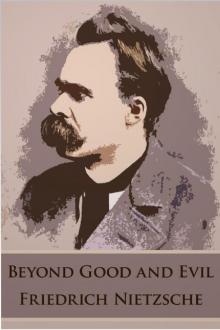- Home
- Friedrich Nietzsche
The Portable Nietzsche Page 7
The Portable Nietzsche Read online
Page 7
[48]
Prohibitions without reasons. A prohibition, the reason for which we do not understand or admit, is almost a command not only for the stubborn but also for those who thirst for knowledge: one risks an experiment to find out why the prohibition was pronounced. Moral prohibitions, like those of the Decalogue, are suitable only for an age of subjugated reason: now, such a prohibition as “Thou shalt not kill” or “Thou shalt not commit adultery,” presented without reasons, would have a harmful rather than a useful effect.
[85]
The persecutor of God. Paul thought up the idea, and Calvin re-thought it, that for innumerable people damnation has been decreed from eternity, and that this beautiful world plan was instituted to reveal the glory of God: heaven and hell and humanity are thus supposed to exist—to satisfy the vanity of God! What cruel and insatiable vanity must have flared in the soul of the man who thought this up first, or second. Paul has remained Saul after all—the persecutor of God.
[86]
Socrates. If all goes well, the time will come when, to develop oneself morally-rationally, one will take up the memorabilia of Socrates rather than the Bible, and when Montaigne and Horace will be employed as precursors and guides to the understanding of the simplest and most imperishable mediator-sage, Socrates. The roads of the most divergent philosophic ways of life lead back to him; at bottom they are the ways of life of the different temperaments, determined by reason and habit, and in all cases pointing with their peaks to joy in life and in one’s own self—from which one might well infer that the most characteristic feature of Socrates was that he shared in all temperaments. Above the founder of Christianity, Socrates is distinguished by the gay kind of seriousness and that wisdom full of pranks which constitute the best state of the soul of man. Moreover, he had the greater intelligence.
[124]
The Faust idea. A little seamstress is seduced and made unhappy; a great scholar in all four branches of learning is the evildoer. Surely that could not have happened without supernatural interference? No, of course not! Without the aid of the incarnate devil the great scholar could never have accomplished this.
Should this really be the greatest German “tragic idea,” as is said among Germans? But for Goethe even this idea was still too terrible. His mild heart could not help putting the little seamstress, “the good soul who forgot herself but once,” close to the saints after her involuntary death; indeed, by a trick played on the devil at the decisive moment, he even brought the great scholar to heaven at just the right time—“the good man” with the “darkling aspiration”! And there, in heaven, the lovers find each other again.
Goethe once said that his nature was too conciliatory for the truly tragic.
[217]
Classical and romantic. The classically disposed spirits no less than those romantically inclined—as these two species always exist—carry a vision of the future: but the former out of a strength of their time; the latter, out of its weakness.
[239]
Why beggars still live. If all alms were given only from pity, all beggars would have starved long ago.
[240]
Why beggars still live. The greatest giver of alms is cowardice.
[261]
Letter. A letter is an unannounced visit; the mailman, the mediator of impolite incursions. One ought to have one hour in every eight days for receiving letters, and then take a bath.
[267]
There are no educators. As a thinker, one should speak only of self-education. The education of youth by others is either an experiment, conducted on one as yet unknown and unknowable, or a leveling on principle, to make the new character, whatever it may be, conform to the habits and customs that prevail: in both cases, therefore, something unworthy of the thinker—the work of parents and teachers, whom an audaciously honest person has called nos ennemis naturels.
One day, when in the opinion of the world one has long been educated, one discovers oneself: that is where the task of the thinker begins; now the time has come to invoke his aid—not as an educator but as one who has educated himself and thus has experience.
[282]
The teacher a necessary evil. As few people as possible between the productive spirits and the hungering, receiving spirits! For the intermediaries falsify the nourishment almost automatically when they mediate it: then, as a reward for their mediation, they want too much for themselves, which is thus taken away from the original productive spirits; namely, interest, admiration, time, money, and other things. Hence one should consider the teacher, no less than the shopkeeper, a necessary evil, an evil to be kept as small as possible. If the trouble in the German situation today has perhaps its main reason in the fact that too many people live by trade and want to live well (and thus seek to cut the producer’s prices as much as possible while at the same time raising the prices to the consumer, in order to derive an advantage from the greatest possible damage to both), then one can certainly find a main reason for the spiritual troubles in the surplus of teachers: on their account, one learns so little and so badly.
[284]
The means to real peace. No government admits any more that it keeps an army to satisfy occasionally the desire for conquest. Rather the army is supposed to serve for defense, and one invokes the morality that approves of self-defense. But this implies one’s own morality and the neighbor’s immorality; for the neighbor must be thought of as eager to attack and conquer if our state must think of means of self-defense. Moreover, the reasons we give for requiring an army imply that our neighbor, who denies the desire for conquest just as much as does our own state, and who, for his part, also keeps an army only for reasons of self-defense, is a hypocrite and a cunning criminal who would like nothing better than to overpower a harmless and awkward victim without any fight. Thus all states are now ranged against each other: they presuppose their neighbor’s bad disposition and their own good disposition. This presupposition, however, is inhumane, as bad as war and worse. At bottom, indeed, it is itself the challenge and the cause of wars, because, as I have said, it attributes immorality to the neighbor and thus provokes a hostile disposition and act. We must abjure the doctrine of the army as a means of self-defense just as completely as the desire for conquests.
And perhaps the great day will come when a people, distinguished by wars and victories and by the highest development of a military order and intelligence, and accustomed to make the heaviest sacrifices for these things, will exclaim of its own free will, “We break the sword,” and will smash its entire military establishment down to its lowest foundations. Rendering oneself unarmed when one had been the best-armed, out of a height of feeling—that is the means to real peace, which must always rest on a peace of mind; whereas the so-called armed peace, as it now exists in all countries, is the absence of peace of mind. One trusts neither oneself nor one’s neighbor and, half from hatred, half from fear, does not lay down arms. Rather perish than hate and fear, and twice rather perish than make oneself hated and feared—this must someday become the highest maxim for every single common-wealth too.
Our liberal representatives, as is well known, lack the time for reflecting on the nature of man: else they would know that they work in vain when they work for a “gradual decrease of the military burden.” Rather, only when this kind of need has become greatest will the kind of god be nearest who alone can help here. The tree of war-glory can only be destroyed all at once, by a stroke of lightning: but lightning, as indeed you know, comes from a cloud—and from up high.
LETTER TO OVERBECK
(Naumburg, November 14, 1879)
. . . My mother read to me: Gogol, Lermontov, Bret Harte, M. Twain, E. A. Poe. If you do not yet know the latest book by Twain, The Adventures of Tom Sawyer, it would be a pleasure for me to make you a little present of it. . . .
NOTES (1880-81)
A girl who surrenders her virginity to a man who has not firs sworn solemnly before witnesses that he will not leave her again for
the rest of her life not only is considered imprudent but is also called immoral. She did not follow the mores; she was not only imprudent but also disobedient, for she knew what the mores commanded. Where the mores command differently, the conduct of the girl in such a case would not be called immoral either; in fact, there are regions where it is considered moral to lose one’s virginity before marriage. Thus the reproach is really directed against disobedience: it is this that is immoral. Is this sufficient? Such a girl is considered contemptible—but what kind of disobedience is it that one despises? (Imprudence is not despised.) One says of her: she could not control herself, that is why she was disobedient against the mores; thus it is the blindness of the desire that one despises, the animal in the girl. With this in mind, one also says: she is unchaste; by this one could not mean that she is doing what the lawfully wedded wife does, too, without being called unchaste. The mores are then seen to demand that one bear the displeasure of unsatisfied desire, that the desire be able to wait. To be immoral means therefore, in this case, not to be able to bear a displeasure despite the thought of the power that makes the rules. A feeling is supposed to be subdued by a thought—more precisely, by the thought of fear (whether it be fear of the sacred mores or of the punishment and shame threatened by the mores). In itself, it is not at all shameful, but natural and fair, that a desire be satisfied immediately. Therefore what is really contemptible in this girl is the weakness of her fear. Being moral means being highly accessible to fear. Fear is the power by which the community is preserved.
If one considers, on the other hand, that every original community requires a high degree of fearlessness in its members in other respects, then it becomes clear that what is to be feared in the case of morality must inspire fear in the very highest degree. Therefore mores have been introduced everywhere as functions of a divine will, hiding under the fearfulness of gods and demonic means of punishment—and being immoral would then mean: not fearing the infinitery fearful.
Of anyone who denied the gods one expected anything: he was automatically the most fearsome human being, whom no community could suffer because he tore out the roots of fear on which the community had grown. It was supposed that in such a person desire raged unlimited: one considered every human being without such fear infinitely evil. . . .
The more peaceful a community has become, the more cowardly the citizens become; the less accustomed they are to standing pain, the more will worldly punishments suffice as deterrents, the faster will religious threats become superfluous. . . . In highly civilized peoples, finally, even punishments should become highly superfluous deterrents; the mere fear of shame, the trembling of vanity, is so continually effective that immoral actions are left undone. The refinement of morality increases together with the refinement of fear. Today the fear of disagreeable feelings in other people is almost the strongest of our own disagreeable feelings. One would like ever so much to live in such a way as to do nothing except what causes others agreeable feelings, and even to take pleasure in nothing any more that does not also fulfill this condition.
(x, 372-75)
One hardly dares speak any more of the will to power: it was different in Athens.
(x, 414)
The reabsorption of semen by the blood is the strongest nourishment and, perhaps more than any other factor, it prompts the stimulus of power, the unrest of all forces toward the overcoming of resistances, the thirst for contradiction and resistance. The feeling of power has so far mounted highest in abstinent priests and hermits (for example, among the Brahmins).
(x, 414 f.)
FROM The Dawn
EDITOR’S NOTE
Another collection of aphorisms, first published in 1881.
[16]
First principle of civilization. Among crude peoples there is a species of customs, the intent of which appears to be custom as such: fastidious and at bottom useless ordinances (as, for example, on Kamchatka, never to scrape the snow off the shoes with a knife, never to spear a coal with a knife, never to put any iron into a fire—and death to him who transgresses in such matters!) which, however, keep in the consciousness the perpetual nearness of custom, the relentless compulsion to live up to custom. To confirm the great principle with which civilization begins: any custom is better than no custom.
[68]
The first Christian. All the world still believes in the authorship of the “Holy Spirit” or is at least still affected by this belief: when one opens the Bible one does so for “edification.” . . . That it also tells the story of one of the most ambitious and obtrusive of souls, of a head as superstitious as it was crafty, the story of the apostle Paul—who knows this, except a few scholars? Without this strange story, however, without the confusions and storms of such a head, such a soul, there would be no Christianity; we should scarcely have heard of a small Jewish sect whose master died on the cross. Of course, if this story had been understood in time; if Paul’s writings had been read not as revelations of the “Holy Spirit” but with an honest and free spirit of one’s own, and without at the same time thinking of all our personal troubles, if they had really been read—and for a millennium and a half there were no such readers—then Christianity would have been done for long ago: so much do these pages of the Jewish Pascal expose the origin of Christianity, just as the pages of the French Pascal expose its destiny and that of which it will perish.
That the ship of Christianity threw overboard a good deal of its Jewish ballast, that it went, and was able to go, among the pagans—that was due to this one man, a very tortured, very pitiful, very unpleasant man, unpleasant even to himself. He suffered from a fixed idea—or more precisely, from a fixed, ever-present, never resting question: what about the Jewish law? and particularly the fulfillment of this law? In his youth he had himself wanted to satisfy it, with a ravenous hunger for this highest distinction which the Jews could conceive—this people who were propelled higher than any other people by the imagination of the ethically sublime, and who alone succeeded in creating a holy god together with the idea of sin as a transgression against this holiness. Paul became the fanatical defender of this god and his law and guardian of his honor; at the same time, in the struggle against the transgressors and doubters, lying in wait for them, he became increasingly harsh and evilly disposed to them, and inclined toward the most extreme punishments. And now he found that—hot-headed, sensual, melancholy, malignant in his hatred as he was—he was himself unable to fulfill the law; indeed, and this seemed strangest to him, his extravagant lust to domineer provoked him continually to transgress the law, and he had to yield to this thorn.
Is it really his “carnal nature” that makes him transgress again and again? And not rather, as he himself suspected later, behind it the law itself, which must constantly prove itself unfulfillable and which lures him to transgression with irresistible charm? But at that time he did not yet have this way out. He had much on his conscience—he hints at hostility, murder, magic, idolatry, lewdness, drunkenness, and pleasure in dissolute carousing—and . . . moments came when he said to himself: “It is all in vain; the torture of the unfulfilled law cannot be overcome.” Luther may have had similar feelings when, in his monastery, he wanted to become the perfect man of the spiritual ideal: and just as Luther one day began to hate the spiritual ideal and the Pope and the saints and the whole clerisy with a true, deadly hatred—all the more the less he could own it to himself—so it was with Paul. The law was the cross to which he felt himself nailed: how he hated it! how he resented it! how he searched for some means to annihilate it—not to fulfill it any more himself!
And finally the saving thought struck him, together with a vision—it could scarcely have happened otherwise to this epileptic. . . . Paul heard the words: “Why dost thou persecute me?” The essential occurrence, however, was this: his head had suddenly seen a light: “It is unreasonable,” he had said to himself, “to persecute this Jesus! Here after all is the way out; here is the perfect revenge; here and nowhe
re else I have and hold the annihilator of the law!”. . . Until then the ignominious death had seemed to him the chief argument against the Messianic claim of which the adherents of the new doctrine spoke: but what if it were necessary to get rid of the law?
The tremendous consequences of this idea, of this solution of the riddle, spin before his eyes; at one stroke he becomes the happiest man; the destiny of the Jews —no, of all men—seems to him to be tied to this idea, to this second of its sudden illumination; he has the thought of thoughts, the key of keys, the light of lights; it is around him that all history must revolve henceforth. For he is from now on the teacher of the annihilation of the law. . . .
This is the first Christian, the inventor of Christianity. Until then there were only a few Jewish sectarians.
[76]
Thinking evil means making evil. The passions become evil and insidious when they are considered evil and insidious. Thus Christianity has succeeded in turning Eros and Aphrodite—great powers, capable of idealization—into hellish goblins. . . . In themselves the sexual feelings, like those of pity and adoration, are such that one human being thereby gives pleasure to another human being through his delight; one does not encounter such beneficent arrangements too frequently in nature. And to slander just such a one and to corrupt it through bad conscience! To associate the procreation of man with bad conscience!

 The Portable Nietzsche
The Portable Nietzsche Twilight of the Idols/The Anti-Christ
Twilight of the Idols/The Anti-Christ Thus Spoke Zarathustra
Thus Spoke Zarathustra Why I Am So Clever
Why I Am So Clever Beyond Good and Evil
Beyond Good and Evil Twilight of Idols and Anti-Christ
Twilight of Idols and Anti-Christ Twilight of Idols and Anti-Christ (Penguin Classics)
Twilight of Idols and Anti-Christ (Penguin Classics)